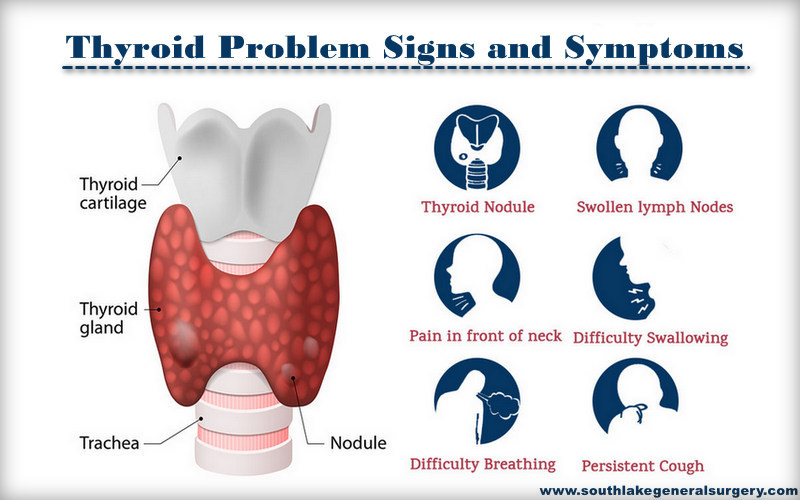
Thyroid Disease
What is the thyroid?
The thyroid gland is a small organ that’s located in the front of the neck, wrapped around the windpipe (trachea). It’s shaped like a butterfly, smaller in the middle with two wide wings that extend around the side of your throat. The thyroid is a gland. You have glands throughout your body, where they create and release substances that help your body do a specific thing. Your thyroid makes hormones that help control many vital functions of your body.
When your thyroid doesn’t work properly, it can impact your entire body. If your body makes too much thyroid hormone, you can develop a condition called hyperthyroidism. If your body makes too little thyroid hormone, it’s called hypothyroidism. Both conditions are serious and need to be treated by your healthcare provider.
What does the thyroid do?
Your thyroid has an important job to do within your body — releasing and controlling thyroid hormones that control metabolism. Metabolism is a process where the food you take into your body is transformed into energy. This energy is used throughout your entire body to keep many of your body’s systems working correctly. Think of your metabolism as a generator. It takes in raw energy and uses it to power something bigger.
The thyroid controls your metabolism with a few specific hormones — T4 (thyroxine, contains four iodide atoms) and T3 (triiodothyronine, contains three iodide atoms). These two hormones are created by the thyroid and they tell the body’s cells how much energy to use. When your thyroid works properly, it will maintain the right amount of hormones to keep your metabolism working at the right rate. As the hormones are used, the thyroid creates replacements.
This is all supervised by something called the pituitary gland. Located in the center of the skull, below your brain, the pituitary gland monitors and controls the amount of thyroid hormones in your bloodstream. When the pituitary gland senses a lack of thyroid hormones or a high level of hormones in your body, it will adjust the amounts with its own hormone. This hormone is called thyroid stimulating hormone (TSH). The TSH will be sent to the thyroid and it will tell the thyroid what needs to be done to get the body back to normal.
What is thyroid disease?
Thyroid disease is a general term for a medical condition that keeps your thyroid from making the right amount of hormones. Your thyroid typically makes hormones that keep your body functioning normally. When the thyroid makes too much thyroid hormone, your body uses energy too quickly. This is called hyperthyroidism. Using energy too quickly will do more than make you tired — it can make your heart beat faster, cause you to lose weight without trying and even make you feel nervous. On the flip-side of this, your thyroid can make too little thyroid hormone. This is called hypothyroidism. When you have too little thyroid hormone in your body, it can make you feel tired, you might gain weight and you may even be unable to tolerate cold temperatures.
These two main disorders can be caused by a variety of conditions. They can also be passed down through families (inherited).
Who is affected by thyroid disease?
Thyroid disease can affect anyone — men, women, infants, teenagers and the elderly. It can be present at birth (typically hypothyroidism) and it can develop as you age (often after menopause in women).
Thyroid disease is very common, with an estimated 20 million people in the Unites States having some type of thyroid disorder. A woman is about five to eight times more likely to be diagnosed with a thyroid condition than a man.
You may be at a higher risk of developing a thyroid disease if you:
- Have a family history of thyroid disease.
- Have a medical condition (these can include pernicious anemia, type 1 diabetes, primary adrenal insufficiency, lupus, rheumatoid arthritis, Sjögren’s syndrome and Turner syndrome).
- Take a medication that’s high in iodine (amiodarone).
- Are older than 60, especially in women.
- Have had treatment for a past thyroid condition or cancer (thyroidectomy or radiation).
